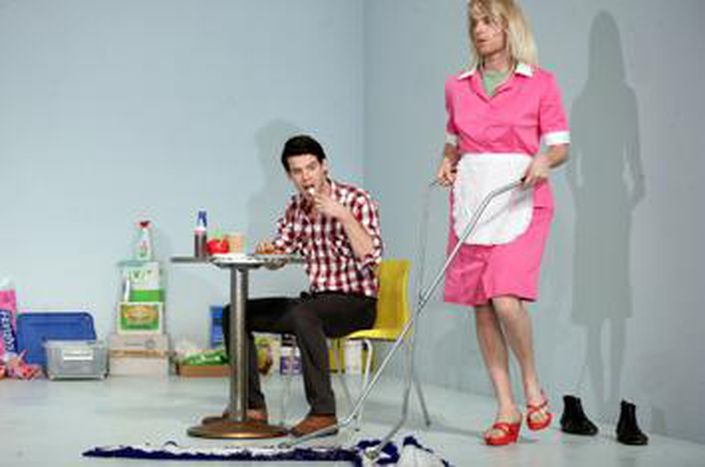
'Over There' Review: Whither the European Union?
Published on
Over There' in London: timely commentary on EU’s current political troubles
''Harry Treadaway (left) and Luke Treadaway (right) | (Image: ©Simon Annand/ Royal Court Theatre) ''
Mark Ravenhill’s unconventional play about identical twins who are reunited after growing up in east and west Germany travelled from London to Berlin this spring.
Our London reviewer calls it a timely commentary on the EU’s current political troubles. Our Berlin reviewer wonders if the British director reproaches the Germans with the repression of history. Cross-reviews from the Royal Court and Schaubühne theatre
London review by Sara Mojtehedzadeh
'The stage is boxy and bright. Its geometric neatness contrasts with the Royal Court Theatre’s dusky quaintness in a startling, almost unnerving fashion. The play begins abruptly, with a set of fraternal twins marching briskly down the aisles and on to the stage; one is cross dressed as a buxom American waitress who promptly sets about seducing the other.
When Mark Ravenhill declared his play Over There to be 'slightly weird', he wasn’t exaggerating.
The work is an ambitious one. It seeks to unpack the fissures between east and west Germany by staging the re-unification of a pair of twins who have been raised on either side of the Berlin wall. The idea and execution are certainly novel. But after the play’s initial shock value dims, the audience is left in a bit of a lull: the symbols and motifs deployed are obvious, the ideological conflict between the twins predictable.
But slowly, imperceptibly, the psychological and emotional dimensions of the brother’s relationship engulf the audience. For a play that is brash and flashy in many regards, its beauty lies in the subtle way that it builds emotion and tension. Through the twins, Ravenhill masterfully traces the virulent euphoria of the fall of the Berlin wall, the initial fascination with the ‘other’ who is at once deeply familiar and entirely alien, and the gradual souring of a relationship that becomes fraught with jealousy and resentment. Karl, the east German twin, becomes overwhelmed with disorientation as his old life is gobbled up by west Germany’s expansion. His desperate defiance is achingly heartfelt; Franz’s attempts to save him are well-intentioned but tinged with paternalism and arrogance. Franz cannot understand Karl’s 'childish' refusal to reject his east German identity wholesale. But paradoxically, Franz finds himself incapable of sharing his world with his brother. 'I don’t want two of us,' he panics. 'I want just me. You have to go.'
The social experiment played out on Ravenhill’s stage doesn’t just mirror the dislocation brought about by German re-unification. It also raises questions about the European Union’s expansion as a whole. Can different pasts, histories, and identities ever be truly reconciled? Or are there unavoidable political and cultural faultlines that threaten the EU’s ambitious quest for supra-nationalism? These issues are particularly relevant in times of crisis. Take the recent EU summit, which raised the specter of a new 'iron curtain' being drawn to protect the interests of western nations’ faltering economies. As central and eastern European states struggle to ward off total economic meltdown, German chancellor Angela Merkel categorically snubbed Hungary’s plea for an eastern-centric bail out plan. In such an environment, past resentments and divisions are dredged up. And as Ravenhill’s play demonstrates, they can be emotionally explosive.
The play was part of the Royal Court's Off the Wall - a season of new plays about Germany
What Franz and Karl’s relationship most powerfully demonstrates is the extent to which integration and expansion in Europe require profound psychological transformation – on both sides of the east-west divide. Like Franz, western Europe is often deeply reticent to share its wealth and privilege. This phenomenon could be put down to a kind of crude power politics, but perhaps this account is not sufficiently complex.
The west’s accomplishments have long fed a myth of superiority, and a belief that its own civilization is a model for the rest of the world. But as cultural, social, political and economic boundaries begin to blur in the European Union, the west is faced with the uncomfortable prospect of abandoning its old claim to uniqueness. Moreover, in the wake of the financial crisis, it has come face to face with its own painful inadequacies. All of this amounts to the kind if identity crisis faced by Franz as he struggles to both share his lifestyle and retain his individuality.
Over the past few years, the EU leadership has deliberated long and hard to determine when and what parts of the east will be ready to join the west. But rare is it for the west critically reflect upon its own preparedness for integration. What are the implications of this reality for the future of the EU? In Over There, the ideological and psychological differences between Franz and Karl, east and west, are insurmountable. But perhaps the play should be read less as a prediction of political troubles to come and more as a cautionary tale. Perhaps what east and west need is a healthy dose of realism about the differences that exist between them and a readiness to engage in a mutual process of transformation. Until that time, substantive European integration will be neither here nor there.
Berlin review can be read here



